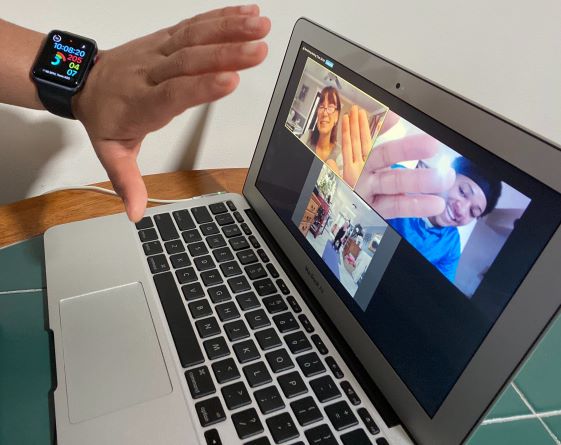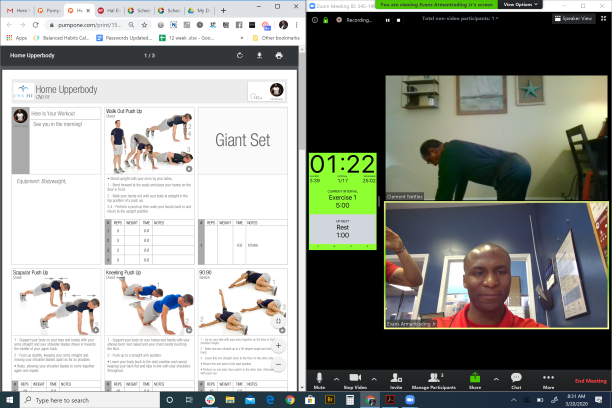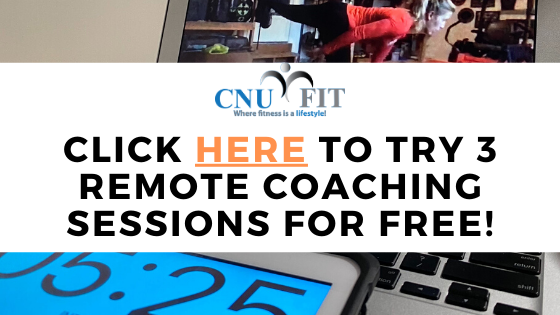Remote coaching: Are you ready to take control of the chaos but don't know where to start?
Are you confused with all the options out there for “online training?”
After 2 months in quarantine you’re probably feeling the desire and need to make a change in regards to your health. You’ve been stressed, overworked, and have had no outlet to focus on yourself. You’ve heard it your entire life…”before you put the oxygen mask on someone else, you have to put it on yourself first,” and now more than ever it’s becoming obvious that that statement applies to your health too. Your family is relying on you to stay healthy, the people you lead are relying on you to operate at pique performance, and for your own sanity you need something that can decrease stress and give you the energy you need to keep going.
There’s only one issue: you have no clue how to get started or what to do to focus on your health because there’s so many options out there.
Since we’ve been hearing the phrase “your health is your wealth” more frequently as of late, we wanted to take some time to really unpack what options there are out there to focus on decreasing your stress and becoming the strong person you need to be in order to take care of yourself, your family, and your team.
There’s a lot of confusion out there right now on options: virtual training, online training, online bootcamps, remote training, remote coaching… the list seems to go on and on. But what exactly are all these things, and how do you know which one is best for you?
That’s what this blog is all about.
Today we’re going to talk about what to look for in a coach, how to make your remote coaching experience as stress free as possible, and some of the top worries about remote coaching and how to conquer them.
First let’s define some terms: you’re probably hearing a lot of things: internet trainer, online trainer, virtual trainer, remote trainer, remote coach---what are all these things and how are they different...and perhaps more importantly which one do you need?
Online training has been around for a long time: trainers selling programs online claim that they will get you into tip top shape in a short amount of time. Recently there’s been some lawsuits about online trainers that have just pressed copy and paste for their programming and handed out the same training program to hundreds of thousands of people all while claiming customization.
Now, not all online trainers do that, but there is one thing that they have in common: no one on one relationship.
The same can be said of what we’re seeing currently in the fitness industry. Right now in this Covid-world we’re finding a hybrid between programs like beach body and a traditional fitness class, where trainers and gyms are going live with free workouts to which folks at home are supposed to follow along with. While you may be getting a “live” experience with a real trainer, there is no customization. Ultimately this is ineffective because everyone’s bodies, goals, and abilities are different and should have exercise programs 100% customized to them.
We always recommend seeking out a remote coach instead of a remote trainer. Here’s the reason why:
The definition of a trainer: a person who trains people or animals.
Trainers are folks who are cheerleaders, tell you you're doing a good job, counts your reps, and tells you what to do. If you think about a trainer going live on Facebook, this is exactly what they do: the say “you’re doing great!” and “keep up the good work!” without even seeing you; they count how many times you should be doing something (assuming you’re able to keep up). While this can be fun, they have no clue whether or not you are doing an exercise correctly and may not even have experience working with someone like you. They also will often hype up your expectations and offer quick-fixes like 21 day challenges to lose 20 lbs.
A coach is different. They take multiple things into consideration in order to serve you to the best of their ability: things like your capacity, what’s going on in your world, stress levels, prior injuries, current pain points, and limitations. They also help you reset your expectations and goals to make them realistic and will help you alter them according to the phase of life you’re in.
When it comes to this new virtual world we’re living in, if you really want to work with someone who has your best interests in mind and can help guide you through the uncertainties of this time as well as take back control of the chaos, you really should be looking for remote coaching.
To really give you a good definition, Remote Coaching is a personalized and progressive fitness program, applied both in functional and non-functional settings where there is a one-to-one relationship between the coach and client.

Now that we know what you should be looking for when it comes to type of training (remote coaching), let’s talk about what you should look for in a coach. The reality is not all coaches are equal and there are multiple things that you should look for in order to get the most out of the experience.
What to look for in a remote coach:
Credentials- Look for someone who has a national certification, preferably one that was conducted in person instead of an online cert. This lets you know that they have some practical experience and training rather than someone who loves to exercise and decided to take an open book test online.
Experience working with people like you- This is especially important with folks that have chronic illness or disease, or prior injuries. You want to find someone who specializes working with someone like you, that way you know that they’ll be able to accommodate your needs.
Reviews- Reviews are probably one of the best ways to tell whether a coach is good or not because they are an honest look into the client experience. Always look for someone who has a lot of good reviews, and if there are a few bad ones pay attention as to whether or not the coach responded to them (this tells how they handle feedback and conflict)
Set’s realistic goals- Always look for someone who is going to tell it to you straight and help you set realistic goals. If all of their marketing material is about quick-fixes (lose 20 lbs in a month!!) then they probably won’t be able to help you long term and you might be left extremely frustrated and disappointed.
Training Philosophy- This goes hand in hand with setting realistic goals. If their training philosophy is to train you so hard that you’re unable to move at the end and to get results as soon as possible, they probably won’t be able to guide you through a stressful time and adjust their training accordingly. Whatever their philosophy is, you want to make sure it aligns with what you’re looking for.
Lives the lifestyle- Always look for a coach that practices what they preach. Not only does this give them relevant life experience to be able to coach you through challenges, but it means that they actually believe their own methodology. Super important!!
Conducts assessments- This is pretty high up there on level of importance, which is why we saved the best for last! Partnering with a coach who conducts assessments is crucial. This is one of the things that differentiates a trainer from a coach. A coach that conducts assessments like a Functional Movement Screen (what we do at CNU Fit) let’s you know that the coach really does want to get to know your body and program accordingly. This is especially important in a virtual environment when they aren’t able to physically be there with you.
Now, you may have concerns when it comes to remote coaching. We know when we made the transition to remote many of our clients struggled at first with a few things, but because we coached and guided them through the transition they realized that with the proper mindset and the proper coach their concerns were no big deal.
Top 5 concerns when starting remote coaching

Safety- You may be thinking: well what if I don’t know what I’m doing, will it be safe? Yes! Because with remote coaching, at least the way we do it at CNU Fit, your coach will have eyes on you the whole time and will be able to verbally guide you through your program, unlike Facebook Live Trainers.
Not tech savvy- You don’t have to be! We use Zoom, so all you need is a laptop, tablet, or phone that has a camera and access to internet. We send you over the link, you click it, and viola you are set up for exercising!
No equipment - This is also what separates a coach from a trainer. An experienced and skilled coach does not need equipment in order to execute effective programming. Body weight exercises are just as effective as exercising with equipment if done correctly.
Space - Believe it or not, you actually don’t need a ton of space to exercise. For our clients, all they need is a space big enough for them to lay down on the floor with. And if they’re in a place like the living room, we’ll use their furniture to help get in their workout!
Time - Ahhh, this is the biggest concern for most busy professionals. For many of our clients who switched to remote, they came to realize that remote coaching actually SAVED them time because they didn’t need to travel back and forth from the gym. They could train in their house or on their lunch break at work, without having “less” of a workout. All you need is 30 minutes and EVERYONE has 30 minutes 2-3 times a week.
When someone does take advantage of remote coaching, there are a few tips and tricks to making the experience AMAZING!
Tips for making your remote coaching smooth:
Good lighting- This is sooo important! Because you’re actually going to be coaching with a person who can see you, they need to be able to see you! Making sure you’re in a well-lit space is essential. Another good tip is to wear clothing that is opposite from your surroundings. Wear light clothing so that your coach can differentiate movements.
Tripod- Tripods are extremely helpful because they allow you to not have to worry about your phone or tablet falling during your coaching session. They also allow you to change your angle if your coach needs to see your feet or different areas of your body better. At CNU Fit we actually send these to all of our clients that way they don’t have to worry about purchasing it for themselves.
Enough space- We mentioned it earlier: you don’t need a ton of space, but you do need enough space.
Good Volume - You’ve probably been on a conference call where you haven’t been able to hear one of the speakers, right? How frustrating! It’s the same feeling for your coach if your volume isn’t high enough, or vice versa. So make sure your volume is all the way up and you limit background noise.
Be Flexible - It’s a whole new world, and that means that sometimes there may be tech glitches or misunderstandings. Be flexible! Coaches are learning during this process too, so flexibility, patience, and understanding is an essential part of having a good experience with remote coaching.
We hope that all of this information helps you find the right coach and have an amazing experience.



